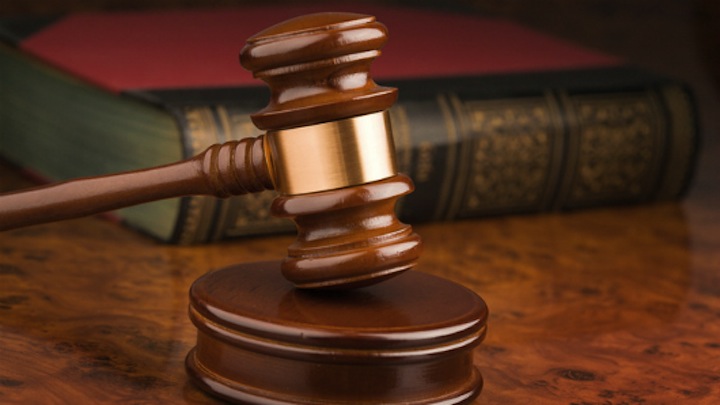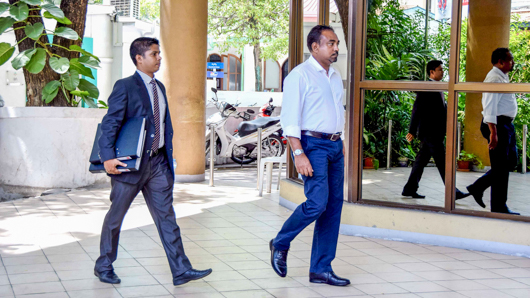Former President Mohamed Nasheed ordered the military to detain Criminal Court Chief Judge Abdulla Mohamed in January 2012, former Defence Minister Tholhath Ibrahim Kaleyfaanu told the Criminal Court last night.
At last night’s hearing of his trial on terrorism charges, Tholhath said the operation to arrest Judge Abdulla – dubbed ‘Liberty Shield’ – was initiated by Nasheed and carried out by then-Malé Area Commander Brigadier General Ibrahim Mohamed Didi, currently an opposition Maldivian Democratic Party (MDP) MP for mid-Hithadhoo constituency.
According to trial observers from the Maldivian Democracy Network (MDN), state prosecutors noted that Tholhath had confessed to initiating Operation Liberty Shield during a previous trial at the Hulhumalé Magistrate Court.
Asked whether Nasheed directly gave the order to Didi – bypassing the defence minister – Tholhath’s lawyer said details of the orders would be explained after the state presents its witnesses.
Tholhath insisted that Nasheed had ordered the judge’s detention on Girifushi Island.
Judge Abdulla’s arrest triggered a police and military mutiny forcing Nasheed’s resignation on February 7, 2012.
In January 2013, Tholhath told parliament’s Government Oversight Committee that Nasheed had not resigned “under duress” in a a coup d’etat. However, Tholhath had previously claimed that Nasheed’s life was in danger on February 7, 2012 and that the former president had no choice but to resign.
During the 2013 presidential campaign, Tholhath campaigned for Jumhooree Party Leader Gasim Ibrahim and later backed eventual winner Abdulla Yameen.
Terrorism trials
At last night’s hearing, Tholhath’s lawyer asked state prosecutors to clarify which offence the former minister was being charged with under Article 2 of the anti-terrorism law.
When the prosecutor explained that the offence was “enforced disappearance,” the lawyer asked whether the state has decided that the highest authority of the military gave orders that amounted to terrorism, and whether the state was suggesting the Maldives National Defence Force (MNDF) was a “terrorist organisation” if soldiers enforce their commanders’ orders.
The lawyer also asked why soldiers involved in the operation were not being charged as accomplices.
In reply, State Prosecutor Abdulla Rabiu said senior officers of the military “used the institution as a veil to commit this atrocity,” noting that senior officials would have had the opportunity to seek legal advice.
The defence lawyer said then-Home Minister Hassan Afeef informed Tholhath that the chief judge was a threat to national security as he was blocking corruption investigations, releasing dangerous criminals, and undermining the criminal justice system.
The lawyer also contended that the Human Rights Commission of Maldives’ (HRCM) investigation could not be admissible as the commission was not legally authorised to investigate acts of terrorism.
However, the prosecutor insisted that the HRCM Act confers powers on the commission to investigate terrorism.
After the judges ruled that the procedural issues were not an impediment to continuing the trial, both the prosecution and defence then submitted a list of evidentiary documents and witnesses, including senior officers of the police and military.
Adjourning the hearing, Judge Abdulla Didi said testimony from state witnesses would be heard at the next trial date.
At last night’s hearing of Nasheed’s trial, Judge Didi and Judge Abdul Bari Yoosuf ruled that there was no conflict of interest for the pair to preside over the trial, despite having testified as witnesses in the case’s investigation.
Along with Nasheed, Tholhath, and Didi, former Chief of Defence Forces Major General (Retired) Moosa Ali Jaleel and Colonel (Retired) Mohamed Ziyad are also on trial on terrorism charges over the chief judge’s arrest.
All five defendants have pleaded not guilty to the terrorism charges. The charges were filed under Article 2(b) of the Prevention of Terrorism Act of 1990, which criminalizes kidnappings, forced disappearances and abductions and carries a jail term of between 10 to 15 years.
At a hearing earlier this week, Jaleel denied any involvement in the judge’s arrest, claiming he neither received nor given any orders to take the chief judge into military custody.
Didi was meanwhile hospitalised on Sunday night after complaining of chest pains. His family told Minivan News today that the retired general would be flown overseas as soon as doctor’s give approval.
Related to this story
Judges Didi and Yousuf refuse to step down from Nasheed’s terrorism trial
Nasheed denies ordering Judge Abdulla arrest, granted three days to answer charges
Former President Nasheed arrives in court with arm in makeshift sling
Chief Judge “took entire criminal justice system in his fist”: Afeef
Likes (2)Dislikes
(2)Dislikes (0)
(0) 
